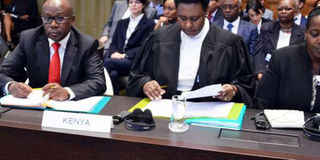Kenya offers to suspend exploration to solve boundary dispute

Attorney-General Githu Muigai (left) and his delegation appear before the International Court of Justice on September 19, 2016 at The Hague, to try and solve the boundary issue with Somalia. The oral hearings on Kenya’s preliminary objections took place from Monday to Friday at the Peace Palace, The Hague. PHOTO | NATION MEDIA GROUP
What you need to know:
- Petroleum exploration is in the disputed 42,000 square kilometres in the Indian Ocean between the line of parallel latitude and the equidistance line.
- Somalia’s delegation of 15 legal, diplomatic and government officials is led by Mogadishu’s ambassador to Belgium Ali Said Faqi.
The push is on for a negotiated settlement to resolve the maritime dispute with Somalia despite the war ravaged nation insisting on the International Court of Justice.
As he concluded his oral submissions last week, Attorney-General Githu Muigai informed the court that Kenya was suspending all explorations in the disputed region as a show of good faith.
He has a team of 22 legal and diplomatic personnel.
"Mr President, in May, we invited Somalia to enter into provisional arrangements pending an agreement on the maritime boundary. We remain open to discussing these arrangements with Somalia.
"I remain confident that the parties will reach an amicable solution consistent with their MOU (memorandum of understanding) of 2009," Prof Muigai said.
Petroleum exploration is in the disputed 42,000 square kilometres in the Indian Ocean between the line of parallel latitude and the equidistance line, the latter which is lies in Somalia.
There are three offshore petroleum exploratory blocks there, L-21, L-23 and L-24.
In his final submissions, Prof Muigai requested the ICJ to uphold its admissibility and jurisdictional challenge.
“The Republic of Kenya respectfully requests the court to adjudge and declare that: the case brought by Somalia against Kenya is not within the jurisdiction of the court and is inadmissible, and is accordingly dismissed.”
However, Somalia wants the ICJ to reject Kenya’s preliminary objections.
In fact in Mogadishu’s final oral submissions on Friday, their representative insisted that the court has jurisdiction over the dispute.
Somalia’s delegation of 15 legal, diplomatic and government officials is led by Mogadishu’s ambassador to Belgium Ali Said Faqi.
“On the basis of its written statement of February 5, 2016, and its oral pleadings, Somalia respectfully requests the Court to reject the preliminary objections raised by the Republic of Kenya; and to find that it has jurisdiction to entertain the application filed by the Federal Republic of Somalia.”
POSSIBLE OUTCOME
The oral hearings on Kenya’s preliminary objections took place from Monday to Friday at the Peace Palace, The Hague, which is the seat of the court.
According to a statement from the ICJ, “the court’s judgement on the preliminary objections will be delivered at a public sitting, the date of which will be announced in due course.”
A finding by the court that Somalia’s case is admissible and the court has jurisdiction over the matter will mean that the dispute goes to full hearing.
Such a determination will also mean that the MoU that Kenya has presented in its objections holds no water and will be thrown out.
In coming up with its judgement, ICJ says the procedure will be for the court to first hold a preliminary deliberation, during which the President of the court Ronny Abraham outlines the issues which, in his opinion, require discussion and decision by the court.
“A full deliberation is subsequently held, at the end of which a drafting committee is chosen by secret ballot, taking account of the views expressed. That committee consists in principle of two judges holding the majority view of the court, together with the president, unless it appears that his views are in the minority.”
That internal judicial committee will prepare three preliminary draft texts.
"In the meantime, judges who wish to do so may prepare a declaration, a separate opinion or a dissenting opinion, which are communicated to the other judges.
"The final vote is taken after adoption of the final text of the judgement at the second reading,” ICJ said in the press statement released at the conclusion of the oral hearings on Friday.
Converse, if the ICJ agrees with Kenya’s preliminary objections, the two countries will be asked to adhere to the MoU and allow the Commission on the Limits of the Continental Shelf that the MoU had agreed on to resolve the dispute.





